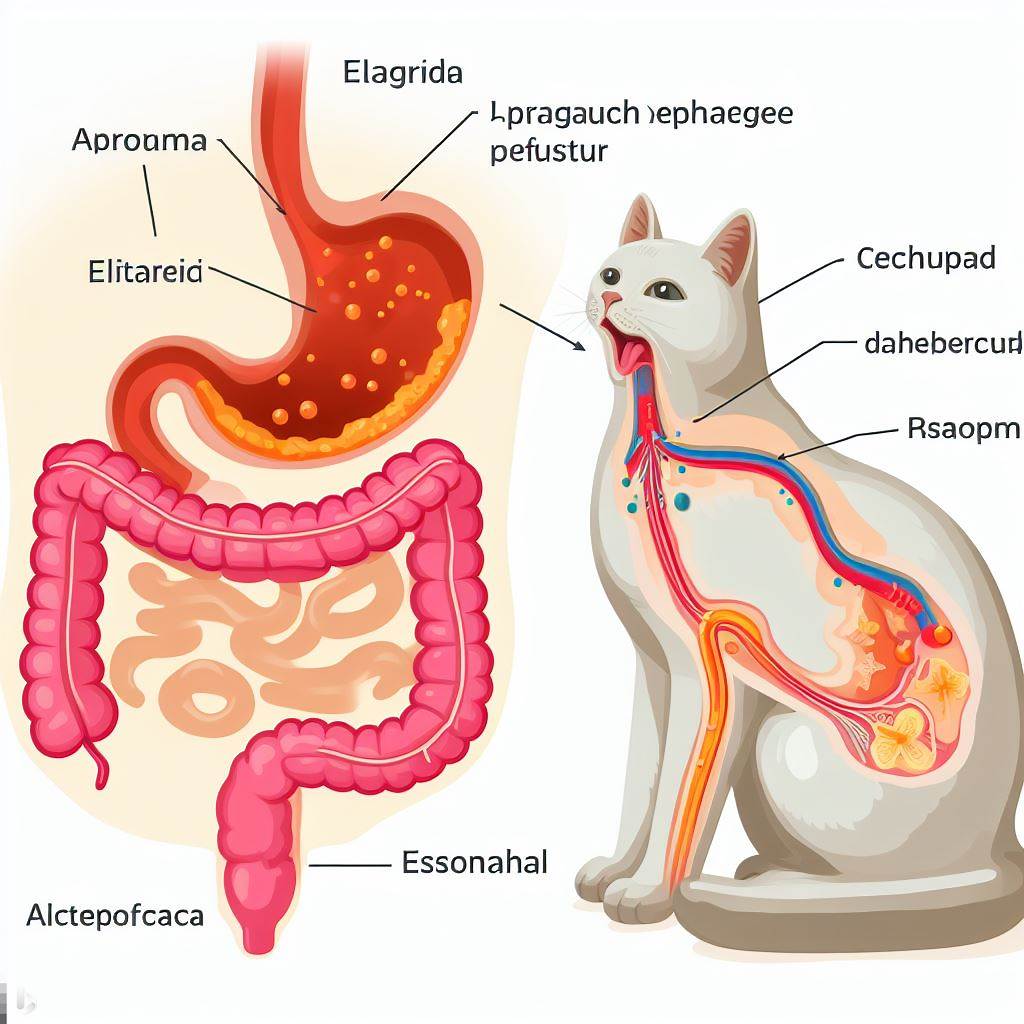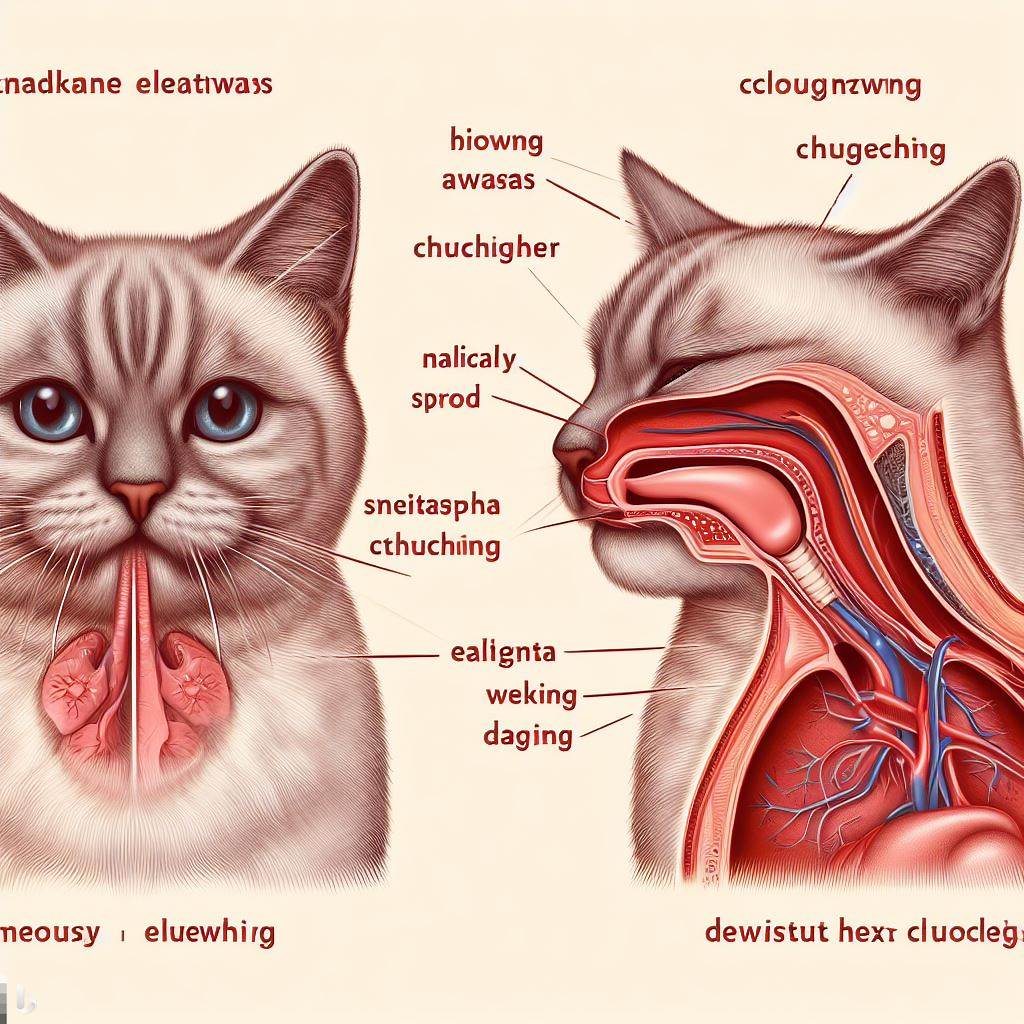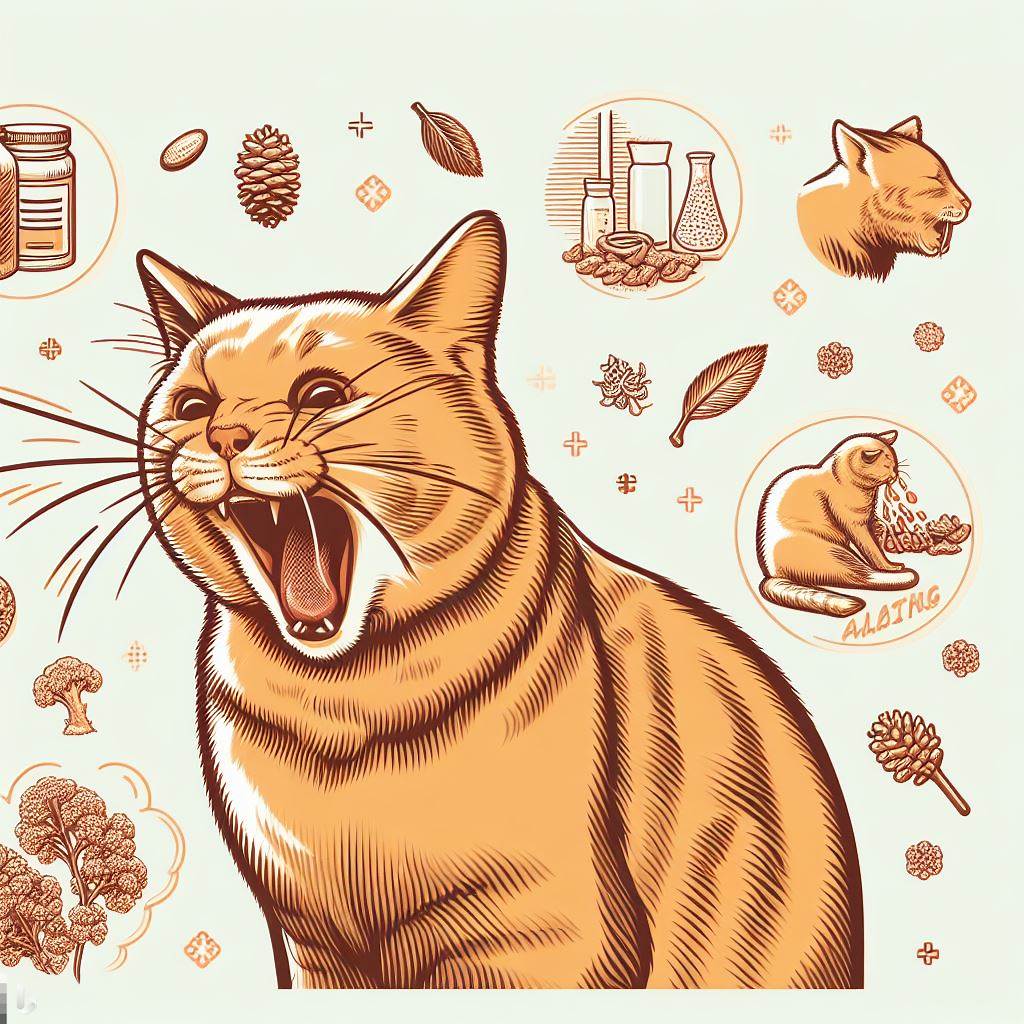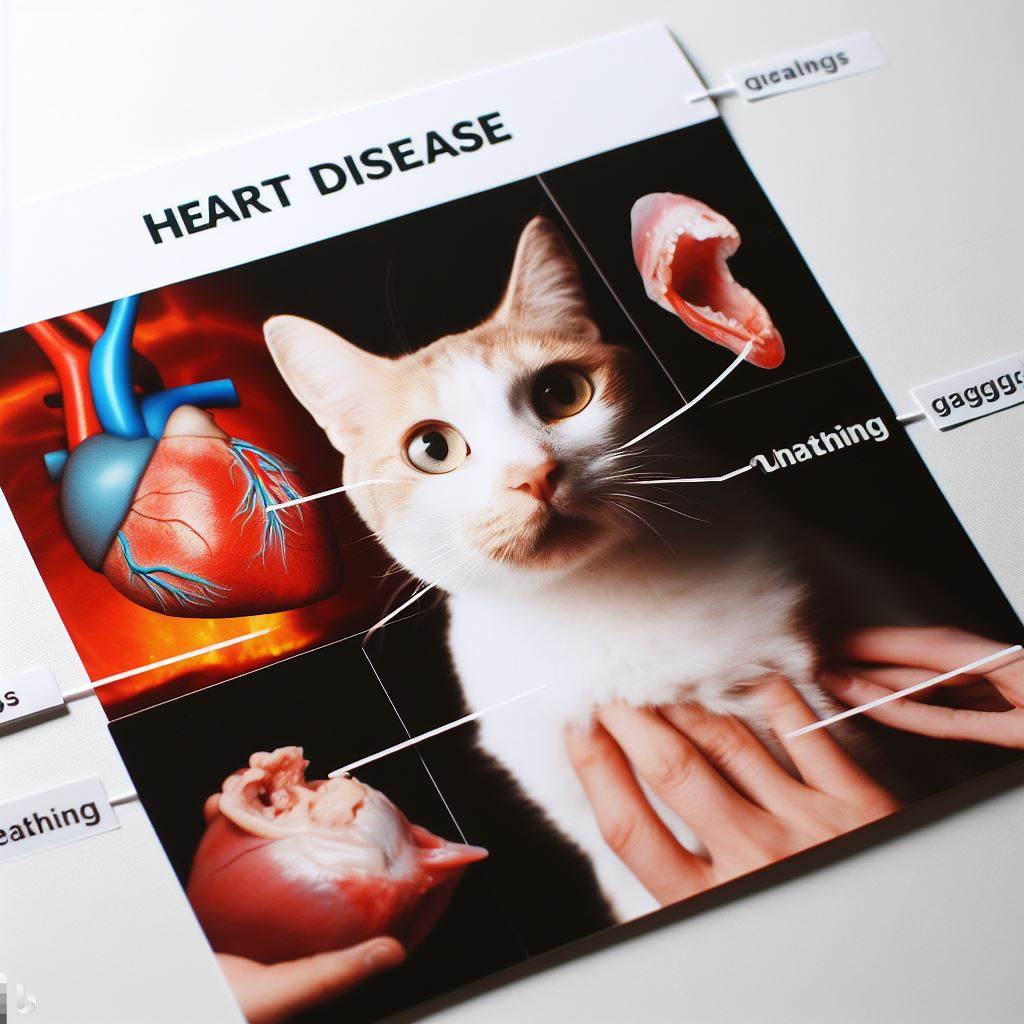If your cat keeps gagging but nothing is coming up, it can be alarming and concerning. Though gagging may seem like a trivial issue, it could be a sign of several underlying health conditions. Some causes are mild and easy to treat at home, while others require prompt veterinary attention.
In this comprehensive guide, we’ll discuss the common and serious causes of chronic gagging in cats. We’ll also provide tips to examine your cat’s symptoms, actionable home remedies, and when to seek emergency vet care.
Common Causes of Gagging in Cats
Here are some of the most prevalent reasons why your cat may be frequently gagging and dry heaving.
Hairballs
Hairballs are the most common cause of gagging in cats. As fastidious self-groomers, cats ingest a lot of fur while licking their coats. The fur accumulates in the stomach and forms large hairballs.

To expel hairballs, cats gag and retch. You may see them open their mouth wide and contract their abdominal muscles. This helps force out hairballs lodged in their throat or stomach.
If nothing comes up, hairballs could still be causing your cat’s gagging due to irritation in the throat. Chronic hairballs can also lead to lack of appetite, lethargy, and constipation.
Acid Reflux
Acid reflux occurs when stomach acid leaks back up into the esophagus. The acidic fluid causes burning irritation and nausea. To clear the refluxed liquid, cats reflexively gag and retch.

Common causes of acid reflux in cats include diet, eating habits, obesity, hiatal hernia, and gastrointestinal issues. Acid reflux is more prevalent right after meals or intense playtime. The gagging brings temporary relief but keeps recurring.
Foreign Object Stuck in Throat
Cats are infamous for their curious and mischievous nature. A foreign object like a piece of plastic, bone, or ball lodged in their throat can obstruct breathing and swallowing.

The blocked airways and discomfort make cats gag repeatedly to try dislodging the object. But their narrow throats make it difficult to bring the item up through gagging alone.
Nausea
Any condition that causes nausea and an upset stomach can potentially lead to gagging. Here are some scenarios that induce nausea and prompt gagging:
- Eating grass to clear upset stomach: This often backfires and causes more irritation.
- Food allergies: Ingesting foods they are allergic to causes nausea.
- Toxins or poison: Accidentally nibbling toxic houseplants or chemicals induce vomiting.
- Viral infections: Feline panleukopenia and calicivirus infections cause severe nausea.
- Medication side effects: Nausea is a common side effect of many antibiotics and deworming medication.
Asthma
Feline asthma is a chronic respiratory disease that causes narrowing of airways. Mucus accumulation and muscle spasms lead to coughing, wheezing, and gagging.

The gagging motions bring up the asthmatic secretions from the lungs and provide temporary relief. But the gagging keeps worsening without long-term treatment.
Allergies
Just like humans, cats can develop seasonal or food allergies. Inhaling allergens like pollen, dust mites, or mold can trigger allergy symptoms.

Allergic reactions cause throat irritation and postnasal drip. To clear the itchy throat, cats repeatedly gag and swallow.
Common signs of allergies include sneezing, wheezing, watery eyes, itchy skin, and ear infections. Seek vet advice to identify and limit allergen exposure.
Serious Causes of Persistent Gagging
While most cases of cat gagging are benign, prolonged and worsening gagging can sometimes indicate a severe underlying condition that requires prompt medical treatment.
Heart Disease
Feline heart diseases like cardiomyopathy and heart murmurs can ultimately lead to congestive heart failure. This causes fluid buildup in the lungs and shortness of breath.

To clear the fluid from their airways, cats retch forcefully. But gagging provides only temporary relief from breathing difficulties. As heart disease worsens, gagging becomes more frequent and severe.
Infections
Bacterial, viral and fungal infections in cats often cause nausea, coughing, and throat irritation. Intense discomfort leads to constant gagging efforts.
Upper respiratory infections from viruses like feline calicivirus primarily cause throat irritation and coughing fits. Gastrointestinal infections make cats nauseous and prone to vomiting. In all cases, treating the underlying infection is key.
Oral Tumors
Tumors developing on the tongue, gums, roof of mouth, or throat tissue can obstruct airflow and swallowing. The lumps make cats gag repeatedly in an attempt to clear the blockage.
Oral tumors tend to be malignant and require swift diagnosis and treatment. Along with gagging, look for symptoms like oral bleeding, difficulty eating, and weight loss.
Kidney Disease
Chronic kidney disease (CKD) in cats produces toxins and acidic waste products that cause nausea. The buildup of uremic toxins leads to vomiting and gagging.
Later kidney disease stages result in ulcers, digestive issues, and loss of appetite. Cat gagging due to CKD needs fluid therapy, anti-nausea medication, and a kidney-friendly diet.
What To Do When Your Cat Starts Gagging
If your cat is showing signs of chronic or severe gagging, don’t ignore it. Here are some tips on examining gagging episodes and taking appropriate action:
- Observe gagging closely: Note details like duration, frequency, intensity, triggers, and accompanying symptoms. This helps pinpoint likely causes.
- Check your cat’s neck gently: Run your hand along their neck to feel for any stuck objects in the throat area. Avoid forcing open their mouth.
- Monitor for hairballs: Watch out for signs of hairballs like licking lips, arching back, and unproductive retching.
- Look for related symptoms: Related symptoms help identify causes like allergies, acid reflux, nausea, respiratory disease.
- Try home remedies: For mild cases, try solutions like grooming, hairball remedies, food changes, or calming medication.
- See a vet promptly: Seek medical advice right away if gagging persists after home treatment. Get exams and diagnostic tests done.
- Learn pet first aid: Know how to check airways, perform pet CPR and prevent choking. Prepare for emergencies.
Thoroughly observing your cat during gagging episodes is crucial. Based on assessment, you can decide between home treatment or professional veterinary care.
Home Treatment and Prevention Tips
In mild cases of occasional cat gagging, some basic at-home care and prevention can help resolve the issue. Here are some tips:
Manage Hairballs
- Groom your cat daily: Regular brushing helps reduce fur ingestion while enhancing bonding.
- Offer hairball relief treats: Lubricating treats make it easier to pass hairballs and soothe the throat.
- Add fiber to diet: Fiber supplements allow hairballs to safely pass through digestive tract.
- Discourage licking: Cats lick excessively due to stress or boredom. Provide diversions like toys.
- Consult a vet: If home remedies don’t resolve chronic hairballs, seek medical advice. Surgery is rarely needed.
Improve Diet
- Feed smaller meals: Small, frequent meals reduce acid reflux. Don’t let your cat gorge.
- Avoid dry food: Dry kibble aggravates nausea and requires more fluid intake. Feed wet food instead.
- Elevate food bowls: Raised bowls, especially for cats with flat faces, decrease acid reflux.
- Wait after playtime: Don’t feed right before or after intense activity or stress. Let the stomach rest.
- Follow a bland diet: For nausea, temporarily feed plain boiled chicken and rice until symptoms improve.
- Treat allergies: If food allergies cause vomiting, strictly avoid allergenic ingredients.
Manage Gastroesophageal Disease
- Limit vomiting triggers: Some dietary items, activities, weather or stressors might be aggravating acid reflux or nausea specifically in your cat. Limit known triggers.
- Give antacids: Over-the-counter antacids like Pepcid help control excess stomach acid. Consult your vet on dosage.
- Feed frequent small meals: Feeding smaller portions 4-6 times a day reduces acid buildup.
- Avoid unnecessary medication: Some supplements, dewormers, antibiotics etc can cause side effects like vomiting if not needed.
- Rule out disease: Persistent reflux and nausea may point to underlying disease. Get diagnostic tests.
Address Allergies
- Reduce allergens at home: Limit dust, cigarette smoke, scented sprays, mold etc in your home to reduce allergic reactions.
- Investigate food allergies: Eliminate common allergens like beef, dairy, chicken etc and observe improvements.
- Bathe and groom regularly: Bathing removes pollen and allergens from coat. Don’t let dead hair accumulate.
- Try antihistamines: Veterinarian-prescribed anti-allergy medication brings relief from symptoms like throat irritation.
- Use air filters: High quality air filters and purifiers help reduce airborne allergens at home.
Manage Asthma
- Give prescribed inhalers: Bronchodilators open airways and make breathing easier for asthmatic cats.
- Avoid triggers: Steer clear of things that aggravate asthma like dust, cigarette smoke, seasonal pollen etc.
- Invest in air purifier: High quality HEPA air purifiers significantly cut down on indoor allergens and irritants.
- Keep up vaccines: Respiratory vaccines help prevent infections that exacerbate asthma.
- Pursue allergy treatment: Controlling allergy symptoms and postnasal drip prevents associated gagging.
- Learn proper inhaler use: Veterinarians can teach you the right inhaler use technique to administer medication to cats.
Address Behavioral Issues
- Deal with stress and anxiety: A stressed cat may excessively groom or eat grass and vomit. Tackle sources of emotional distress.
- Provide enrichment: Bored cats get into mischief like nibbling houseplants or foreign items. Engage them with puzzles, playtime and cat TV.
- Redirect bad habits: Discourage vomiting-inducing habits like grass eating or plastic chewing.
- Use calming supplements: Temporarily use calming treats, pheromone diffusers or anti-anxiety medication if recommended by your vet.
Prepare for Emergencies
- Learn cat CPR: Taking a pet first aid class prepares you to assist a choking cat. Know how to check airways.
- Keep emergency numbers: Have your veterinarian’s emergency contact information handy. Also identify the nearest 24-hour emergency clinic.
- Remove dangers: Keep potentially swallowed items like string, rubber bands, sewing supplies etc out of reach. Cat-proof your home.
- Stock first aid kit: Have a pet first aid kit ready with syringe, lubricant, saline, cloth muzzles and other items.
With some diligence about diet, grooming, reducing allergens and managing stress, you can troubleshoot cat gagging at home effectively in many cases. But don’t hesitate to call the vet if you have any concerns.
When To Seek Veterinary Help
In specific situations, or if gagging persists despite home treatment, your cat needs to be seen by a vet immediately. Here’s guidance on when to seek medical intervention:
Take your cat to the emergency vet promptly if:
- Gagging leads to breathing difficulties, wheezing or coughing fits
- Episodes last longer than 10 minutes
- Your cat seems in severe distress while gagging
- Gagging causes lethargy, weakness or collapse
- Object stuck in throat is visible or strongly suspected
- You notice signs of choking like pawing at the mouth, pale gums, weakness
- There’s excessive drooling, bleeding or foul odor while gagging
- Your cat is unable to swallow food or water
- Significant weight loss, poor appetite or dehydration along with gagging
- Other concerning symptoms accompany like diarrhea, fever, nasal discharge etc
See your regular vet if:
- Gagging happens frequently – multiple times a week
- It lasts for a few weeks despite home treatment
- Your cat shows signs of hairball distress like lip licking, back arching
- You notice any mouth lumps, oral bleeding or dental issues
- Your cat has recurring nausea and vomiting
- Allergy symptoms, respiratory issues, or skin irritation accompany gagging
- Your cat eats non-food items like paper, string or houseplants
Even if you don’t witness gagging episodes, take your cat in for hepatic lipidosis bloodwork if there is decreased appetite or sudden weight loss. Chronic intermittent gagging also warrants examination and diagnostic tests to determine underlying disease. Vets can prescribe medication to control nausea, reflux, allergies, asthma, oral tumors and other complications causing your cat’s gagging.
Diagnostic Tests Vets May Run
To get to the bottom of chronic gagging in cats, vets can perform various examinations and lab tests. Here are some diagnostic steps:
- Physical exam – checks vitals, palpates throat and abdomen, listens to heart and lungs, inspects mouth for masses.
- Blood work – completes blood count to identify infection and organ issues. Checks thyroid levels.
- Fecal exam – checks for intestinal parasites causing nausea.
- Biochemistry profile – evaluates kidney, liver, pancreatic and electrolyte levels.
- Urinalysis – assesses kidney function and infection. Checks for crystals.
- Endocrine tests – diagnose thyroid or adrenal disorders causing vomiting.
- Imaging – X-rays and ultrasound of chest and abdomen to visualize masses or foreign objects.
- Endoscopy – inserts a flexible scope with camera into the digestive tract to inspect for lesions.
- Biopsy – takes a tissue sample of any growths for cancer testing.
Based on initial findings, vets may recommend specialized tests like a bronchoscopy to examine the airways or an EKG to check heart rhythm and function. Prompt professional diagnosis and treatment improves the outcome in chronic gagging cases significantly.
How Vets Treat Chronic Gagging in Cats
Depending on the underlying cause, vets can provide suitable medical treatment for recurrent gagging and vomiting in cats:
- Emergency care – for choking or blocked airways, immediate intervention is given. Sedation and oxygen may be administered. Endoscopy or surgery removes foreign objects.
- Fluid therapy – intravenous fluids treat dehydration and restore electrolyte balance.
- Anti-nausea medication – drugs like Cerenia and Zofran help control vomiting and improve appetite.
- Diet change – bland, easy to digest prescription food is recommended.
- Acid reducers – antacids like Pepcid or proton pump inhibitors like Prilosec reduce stomach acid production.
- Prokinetics – medicine like Reglan improves gastric motility and stomach emptying.
- Antibiotics – treat bacterial infections of the respiratory or digestive tract causing cat gagging.
- Anti-inflammatories – reduce swelling and mucus production in nasal/airway passages.
- Anti-allergy medication – control allergy symptoms like throat itching that prompt gagging.
- Inhalers – help open restricted airways in asthmatic cats.
- Heart medication – diuretics remove fluid from lungs, other drugs improve heart function.
- Chemotherapy – slows and shrinks growth of certain oral cancers.
- Surgery – fully removes benign oral tumors. Extracts foreign bodies.
With professional veterinary treatment guided by diagnostic findings, most causes of cat gagging can be effectively managed for a good quality of life.
FAQs About Cat Gagging and Dry Heaving:
Here are some common questions cat owners have regarding gagging and vomiting:
Q: Is it an emergency when my cat is gagging repeatedly?
A: Gagging that lasts over 5 minutes, impairs breathing, or is accompanied by collapse needs emergency vet care. Mild and short bouts generally don’t require an ER visit. But do monitor your cat closely and call your vet.
Q: How can I stop my cat from eating grass and vomiting?
A: Try more frequent brushing, interactive playtime, calming supplements and indoor cat grass to reduce grass chewing. Identify and address causes of nausea like food allergies. Redirect your cat gently when they attempt to ingest grass.
Q: Why does my cat gag after drinking water?
A: Possible reasons include acid reflux where water triggers stomach acid production, nausea making swallowing difficult, oral tumors obstructing the throat, and diseases like laryngeal paralysis affecting swallowing. See your vet to determine causes.
Q: When should I be concerned about feline gagging and seek medical help?
A: Seek vet advice if gagging persists beyond a day or two, causes breathing problems, is projectile, contains blood, happens alongside other concerning symptoms, or impedes eating and drinking. Recurring gagging warrants examination.
Q: Is it normal for cats to gag occasionally?
A: Occasional gagging is quite common, especially if it successfully brings up a hairball and provides relief. But frequent or severe bouts of unproductive gagging and retching




